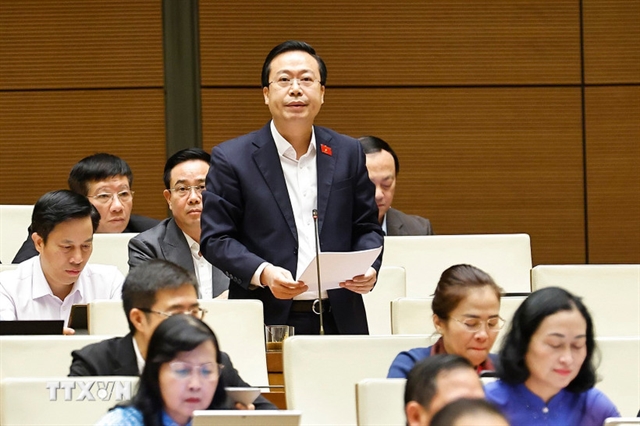 Politics & Law
Politics & Law

 |
| Deputy Nguyễn Đại Thắng from Hưng Yên Province spoke at the National Assembly meeting on October 29 in Hà Nội. VNA/VNS Photo |
HÀ NỘI — National Assembly (NA) deputies yesterday debated the implementation of the 2025 socio-economic development plan and projections for 2026, as well as the NA’s resolutions on the 2021–2025 five-year plan for socio-economic development and economic restructuring.
Deputy Nguyễn Đại Thắng from Hưng Yên Province agreed with the Government’s report assessing the implementation of the NA’s resolution on the 2021–2025 socio-economic development plan. However, he noted that pressure to maintain macroeconomic stability remains substantial.
The real estate, gold, and bond markets remain complex, while science, technology, innovation, and digital transformation have yet to become key drivers of growth. Labour productivity growth targets also remain below expectations, Thắng said.
“To improve development efficiency, the Government should shift the growth model from extensive to intensive, placing productivity, innovation, science and technology at the core of growth,” he said.
“The Government should increase investment in research and development to at least 1.5 per cent of GDP, encourage enterprises to allocate part of their funds for science and technology, grant tax exemptions for those conducting applied research and establish a national innovation support fund to assist technology enterprises, supporting industries and digital transformation initiatives.”
According to statistics, more than 70 per cent of export turnover comes from the FDI sector, but domestic value-added remains below expectations.
Thus, foreign investment attraction should shift from quantity to quality, with selective policies prioritising projects that commit to technology transfer, employ Vietnamese workers and partner with domestic enterprises in electronics and semiconductor manufacturing.
Regarding the GDP growth target for 2026, set at over 10 per cent, Deputy Trần Hoàng Ngân from HCM City said the “target is ambitious but achievable”, noting that over 40 years of Đổi mới (renewal), Việt Nam’s economic potential has continuously expanded.
Ngân proposed that the country should leverage its geo-economic and geopolitical advantages, focusing on developing the marine economy, logistics, agriculture, high-quality services, healthcare and education.
He also emphasised the importance of addressing environmental, cultural, healthcare, social and human development issues to improve the quality of life and happiness of the people.
“It is heartbreaking to see people suffering from the impacts of natural disasters and floods, with many localities severely affected,” Ngân said.
“I propose that the Government promptly submit to the NA an emergency financial package—allowing for a higher budget deficit and increased spending beyond projections.
“The current budget deficit is 3.2 per cent of GDP, below the planned 3.6 per cent, leaving room to act. Doing so would bring happiness to the people and repair infrastructure damaged in affected areas.”
Discussing the 2021–2025 socio-economic development situation, Deputy Huỳnh Thanh Phương of Tây Ninh Province said there remain many issues requiring candid assessment.
These include the slow transition in the growth model and economic structure, low labour productivity and value-added, limited contributions from technology and innovation, complex and inconsistent institutions, policies and administrative procedures, delays and inefficiencies in public investment projects and persistent financial, real estate and corporate bond market risks.
Human resource quality also falls short of new development demands.
Phương recommended maintaining macroeconomic stability, managing fiscal and monetary policies proactively and flexibly, ensuring major economic balances, controlling inflation, restoring market confidence and supporting sustainable business recovery and development.
He also emphasised the need to improve institutions, enhance the business environment, eliminate overlaps in decentralisation and accountability and mobilise resources to foster entrepreneurship and innovation across society.
The Government should continue to promote digital transformation, green economy, circular economy and just energy transition, aiming for rapid yet sustainable development that links economic growth with environmental protection and climate change adaptation.
It should also build a contingent of upright officials who take responsibility and are willing to face difficulties and challenges, considering this the decisive factor for the success of all reform policies.
“Development should not focus solely on growth but also on the happiness of the people. By 2030, we must strive for 75 per cent of citizens to feel satisfied and happy with their lives. That should be the most meaningful measure of development,” said Phương. — VNS
Loading rewrite




